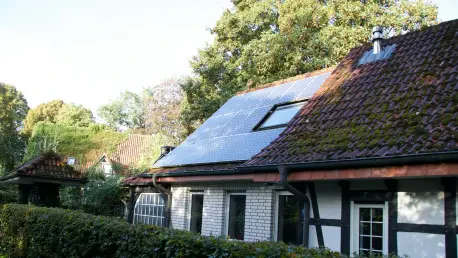Vivint, a prominent figure in the smart home domain for over a quarter-century, has recently undergone a notable transformation by shifting its focus towards energy management, enhancing its traditionally security-centric offerings. This strategic rebranding, marked by a refreshed logo, reflects Vivint’s integration into the services of its new parent company, NRG. The merger illustrates a significant evolution as Vivint seeks to redefine the smart home landscape, synergizing its expertise in security with a new emphasis on energy management. This transition speaks to the growing consumer interest in energy efficiency and sustainable living. As utility expenses rise and power outages become more frequent, the demand for energy management solutions is expected to burgeon. Vivint’s current emphasis on smart thermostats serves as a foundation upon which it plans to build more comprehensive energy management tools. This initiative could include innovations like smart electrical panels or intelligent load management, driven by decreasing technological costs.
Historical Context and Legal Challenges
Vivint launched in 1999 as a security-centric entity and expanded into smart home automation by 2011, heralding a new era for the company. Despite these advancements, Vivint faced legal challenges, including allegations of deceptive practices and patent violations. These issues culminated in lawsuits from industry leaders like Alarm.com and ADT, along with a significant $20 million fine from the Federal Trade Commission. These challenges prompted Vivint to rethink its business strategy, as relying solely on security system installations did not yield the expected recurring revenue. By incorporating energy management into its offerings, the company aims to address these past problems while accommodating the growing demand for integrated smart home solutions. Vivint’s decision to blend security with energy management aligns with its intention to emerge as a comprehensive smart home solutions provider, focusing on efficient energy use within residential settings. This transformation is not just a reaction to past challenges but a forward-thinking move to stay competitive in a rapidly evolving market.
Strategic Integration with NRG
Vivint’s acquisition by NRG signals a promising shift in its business model, leveraging smart home technologies to meet the increasing demands of the energy management sector. NRG, established in utility and home services, provides a robust foundation for Vivint to innovate in energy solutions. This partnership reflects a strategic response to industry trends and a proactive approach to rising utility costs and energy demands. While Vivint’s current energy management tools are limited to smart thermostats, the rebranding indicates a commitment to expanding its product line. By integrating advanced automation efficiencies and energy solutions, Vivint aspires to offer comprehensive smart home systems that meet modern consumer needs. These efforts could involve developments such as intelligent load management systems, capable of optimizing energy distribution within homes. This pivot aligns with the broader industry shift towards sustainable living, underscoring Vivint’s role in providing innovative, efficient, and sustainable home energy solutions.
Future Prospects and Market Position
Vivint’s transition from a predominantly security-based service to a full-fledged smart home solutions provider that emphasizes energy management reflects its commitment to evolving consumer needs. By prioritizing energy efficiency and sustainability, Vivint positions itself at the forefront of a market driven by environmental concerns and technological advancements. While challenges remain, notably in expanding its product offerings and achieving market penetration in energy management, Vivint’s strategic collaboration with NRG offers substantial potential. This rebrand enables Vivint to address consumer expectations for integrated, smart home technologies capable of reducing energy consumption and enhancing lifestyle convenience. The integration of security and energy management not only seeks to meet current demands but also anticipates future trends in home automation, positioning Vivint as a forward-thinking leader in the smart home industry.
Conclusion and Future Considerations
Vivint, a leader in the smart home sector for more than 25 years, has undergone a significant transformation by broadening its focus to include energy management, complementing its traditional security-based offerings. This strategic rebranding, highlighted by an updated logo, signals Vivint’s integration into NRG’s suite of services following their merger. This change marks a substantial shift as Vivint redefines the smart home industry by combining its security expertise with a new concentration on energy management. This shift aligns with consumers’ increasing interest in energy efficiency and sustainable living. As utility costs soar and power disruptions become more common, the need for energy management solutions is expected to rise sharply. Vivint is currently focusing on smart thermostats, laying a base for more extensive energy management systems. Future initiatives may feature advancements like smart electrical panels or intelligent load management, made more feasible by decreasing technology costs.









